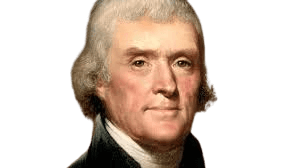Life and achievements
Early life
Thomas Jefferson was the third child and the second son of Peter Jefferson, a planter and merchant, and Jane Randolph Jefferson. His father, Peter Jefferson, was a surveyor and a map maker, and his mother, Jane Randolph, belonged to a prominent family. Jefferson was born the third of ten children in a family that could hardly be considered wealthy but was relatively well-to-do.
Jefferson was a learner from childhood, and he understood things very fast. Reverend James Maury homeschooled him and preferred classical languages and literature. Jefferson started going to school at the College of William & Mary in Williamsburg at the age of 16 and was a very good student. He also got to know George Wythe and Francis Fauquier, who were significant persons of the time. These relationships were crucial in shaping his intellectual and political identity.
Jefferson was a versatile learner who studied law, philosophy, sciences, and arts. He went to the College of William and Mary and later became an apprentice to George Wythe to study law. He was admitted to the bar in 1767. Although he did not participate in significant cases, he was known for his academic approach and professionalism in adhering to the legal framework. Therefore, the early years of Jefferson helped to build his political outlook and activities in the United States of America.
Legacy
Thomas Jefferson is undoubtedly one of the most prominent leaders in United States history, and his heritage is rather multifaceted and controversial. Jefferson was also the mastermind behind the Declaration of Independence, which stated that freedom and equality were the foundation of America. Today, people can see the reflection of his dream of an agrarian republic and his support of education and individual rights.
The presidency of Jefferson can be called successful because his administration managed to accomplish several significant events, namely the Louisiana Purchase, which expanded the area of the United States, and the Lewis and Clark Expedition, which charted the newly acquired lands. The protection of religious liberty, the right to build the wall between church and state, as seen in the Virginia Statute for Religious Freedom, set the foundation of the First Amendment rights.
However, the heritage left behind by Jefferson is rather complex due to his status as an enslaver. Despite expressing his opposition to the institution and even manumitting some of his slaves, he was a lifelong enslaver and fathered children with Sally Hemings, an enslaved woman at Monticello. This part of his life has been a focus of debate concerning the ethical and moral aspects of the man.
In education, the University of Virginia, founded by Jefferson, is an example of how knowledge has helped to transform society. The university's liberal arts and sciences education system and unique architectural structure are remnants of Jefferson's enlightenment and his visions of nurturing leaders for the future.
It is noteworthy that Jefferson's ideas and works remain relevant and influence people to this day. Today, his dream of a nation based on the principles of liberty, justice, and human dignity is far from dead in American society and politics. Jefferson may have his flaws and inconsistencies, but he did a lot to form the United States of America.
Milestone moments
Jul 21, 1776
Essential Tasks in the Process of Writing the Declaration of Independence
Jefferson penned the Declaration of Independence, in which the colonies stated their reasons for liberating themselves from the British.
The document asserted what natural rights people had and that a monarchy had no authority over free people.
The highly articulated principles of Jefferson's Enlightenment provided the foundation for the new nation.
He said, "We hold these truths to be self-evident that all men are created equal," this phrase became one of the significant maxims of American culture.
Jun 21, 1803
Louisiana Purchase
Jefferson, as President of the United States, signed the treaty that gave way to the acquisition of the Louisiana Territory from the French, thus expanding the size of the United States.
It offered a vast area for development and expansion, which was Jefferson's vision for an agrarian republic.
Nonetheless, the acquisition was contested on constitutional grounds; however, the Jeffersonian common-sense orientation improved the nation's strategic position.
The Louisiana Purchase was a $15 million deal that acquired 828,000 square miles of territory, moving America's sovereignty to the western side of the Rockies.
May 21, 1804
Lewis and Clark Expedition
Jefferson hired Meriwether Lewis and William Clark to explore the newly bought Louisiana Territory and find a passage to the Pacific Ocean.
It provided helpful information on the physical location, natural products, and the aboriginal people of the western region of the United States.
Jefferson supported the expedition for scientific reasons and to gain knowledge and strength for America.
It was the start of westward expansion and the concept of Manifest Destiny, which contributed to the future of the United States.
Mar 4, 1801
Inaugural Address as the Third President of the United States of America
Jefferson's inauguration became the first case of the peaceful transfer of power in the United States of America, marking the beginning of democracy.
During his inauguration speech, he stressed the integrity of the state, the non-interference of the government in citizens' lives, and the protection of civil liberties; he spoke the Republican Party language.
Jefferson was a fiscal conservative who wished to discharge the national debt, reduce military expenditures, and abolish internal taxes.
He limited the federal government's authority and championed the liberties of individuals in his regime to form a democracy.
